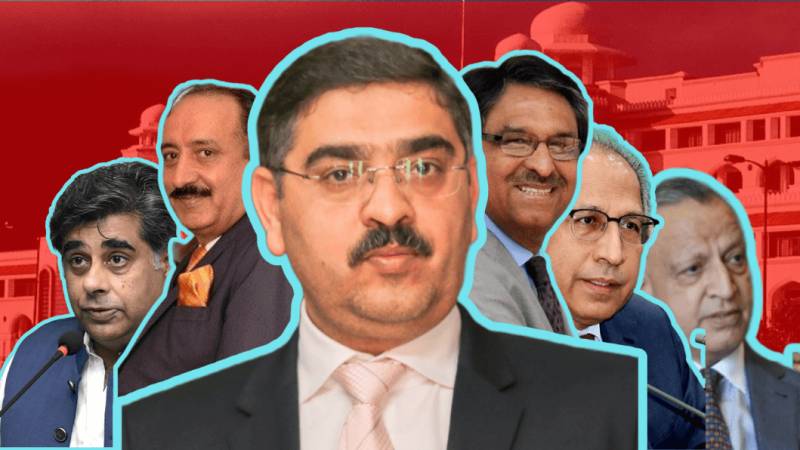
As the jumbo federal cabinet of former prime minister Shehbaz Sharif heads home after the dissolution of the National Assembly, the incoming Caretaker Prime Minister Anwaarul Haq Kakar will look to helm a significantly leaner team to run the day-to-day affairs of the country for the tenure of their interim government.
Kakar, who was sworn in as the caretaker prime minister on Monday is likely to appoint a 15-member cabinet. Some names who could be part of the future interim cabinet have been decided, while a few more are still being deliberated, and sources shared with The Friday Times.
Shehbaz oversaw, what was perhaps the biggest cabinet in the country's history spanning some 81 members all told, including 33 federal ministers, seven Ministers of State, four advisors and a whopping 37 Special Assistants.
A tight ship
Sources say, unlike Shehbaz's cabinet, Kakar will run a tight ship.
Since he does not have to carry the burden of pleasing a rainbow coalition or adhere to restrictions of ministers elected to the lower or upper houses, there will be very few advisers and special assistants.
Speaking to The Friday Times, legal expert and former Attorney General of Pakistan (AGP) Ashtar Ausaf said that the caretaker cabinets are usually feature very few members because they are simply responsible for running the day-to-day affairs of government.
Further, he said the law on contracting or expanding a caretaker cabinet is almost the same as the cabinet for an elected prime minister. The strength of both depends on the discretion of the prime minister.
It is pertinent to note here that throughout history, caretaker cabinets in Pakistan have varied in strength, but none have exceeded 15 members.
The first caretaker government of Pakistan had few cabinet members.
The caretaker government, led by Malik Meraj Khalid, had 12 members.
The caretaker setup led by Mohammadmian Soomro had a cabinet of 15 members. The caretaker government setup led by Mir Hazar Khan Khoso had a cabinet of eight members.
The most recent caretaker government of Pakistan, in 2018, had the smallest cabinet consisting of only six members.
Article-92 requires that the number of ministers and ministers of state in the federal cabinet should not exceed 11 percent of the total membership of parliament, and the law is seemingly silent in case of interim setup.
Could old faces return
Like Kakar's nomination, names of most new caretaker federal cabinet members remain a mystery.
However, sources close to him claim that some names are almost final, with technocratic and bureaucratic faces.
Former finance minister Dr Hafeez Sheikh will likely take charge as Caretaker Finance Minister given his history in managing the country's economic affairs twice in the past decade and a half, particularly managing the IMF.
Elsewhere, a prominent leader of the country's textile millers community, Gohar Ejaz, will likely be appointed as the Caretaker Minister Of Industries and tasked with boosting exports.
Further, former federal foreign secretary Jalil Abbas Jilani will likely take up the mantle as the Caretaker Foreign Minister.
Police and justice sector reforms specialist Dr Shoaib Suddle is likely to take up the post of Caretaker Federal Interior Minister in what promises to be a challenging period regarding law, order and security.
Famous legal brain and former Supreme Court Bar Association President Muhammad Ahsan Bhoon is tipped to become the Caretaker Law Minister.
Other names such as Zulfiqar Cheema, Sarfraz Bugti, Faisal Vawda, and Khurram Rokhari are rumoured to make it into the caretaker federal cabinet.
Challenges ahead
The biggest challenge the incoming cabinet has to tackle will be to complete preparations for holding the general elections within the stipulated time, apart from managing the flagging economy and dealing with the tough schedule set by the International Monetary Fund (IMF).
Other challenges would be to boost the local economy, and create a conducive environment for polls to be held peacefully, apart from tackling crucial legal issues before the court whilst walking a diplomatic tightrope on the foreign policy front.

